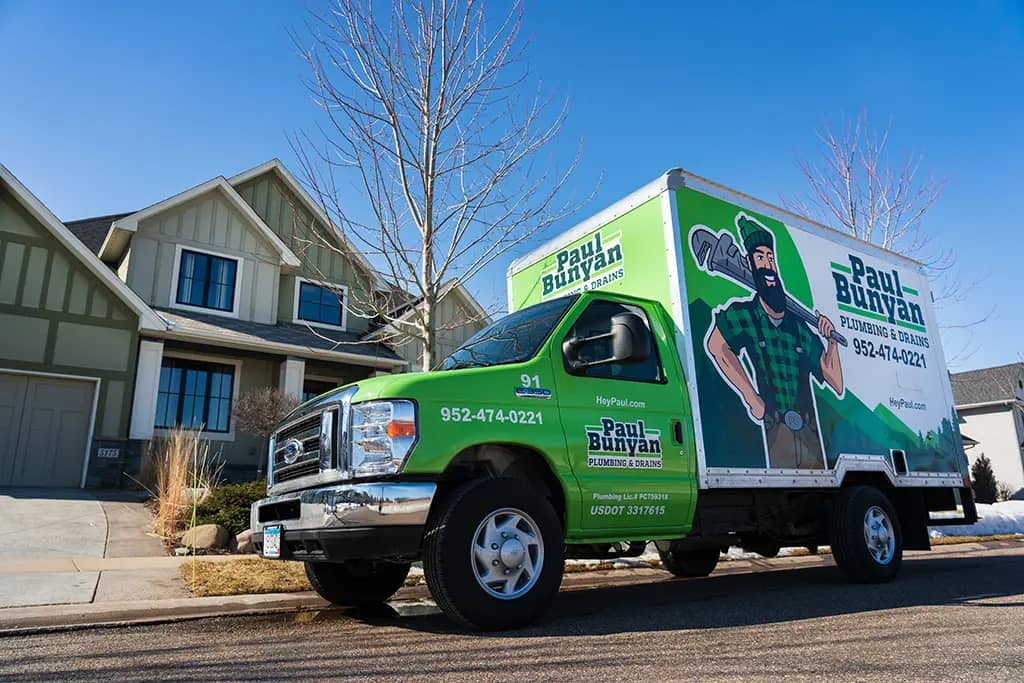Copper has been the number one choice for plumbing pipes in both residential and commercial buildings since the 1960s. It’s a material that’s durable, resistant to corrosion, relatively inexpensive, has antimicrobial properties, and conducts heat really well.
While copper pipes are still frequently used in Minneapolis, MN plumbing, in recent years PVC has become an increasingly popular choice. PVC, or polyvinyl chloride, is lightweight, extremely durable, and even more cost-effective than copper, especially when it comes to water line repair.
If your home’s plumbing pipes are aging or becoming corroded, if you have any leaky pipes in need of water line repair, or you’re simply looking to upgrade your plumbing system, you’ll want to know the differences between copper and PVC pipes.
Copper Plumbing Pipes
Copper isn’t just a popular choice for plumbing pipes, for many years it was the only choice. Plumbers and contractors like it because it’s incredibly strong and durable, yet it’s thin and flexible. It’s also inexpensive and naturally-occurring, so it’s generally very easy to source copper, which comes in handy when your line of work often involves emergency water line repair in Minneapolis, MN. Being that copper is metal, it can lend a distinct metallic taste to drinking water.
PVC Plumbing Pipes
For a variety of reasons, PVC is becoming an increasingly popular choice for pipes. It’s ultra-lightweight, extremely flexible, low-cost, and resistant to fractures, rust, and flames, which makes PVC suitable for virtually any environment or building type. The completely smooth insides of PVC pipes also provide optimal friction and flow and inhibit the growth and accumulation of slime.
Which Is Better For Pipes, Copper or PVC?
You could ask 25 contractors and plumbers whether they prefer PVC or copper pipes, and you would almost certainly get 25 different answers. It largely depends on the specific application, how likely water line repair is in the near future, and the current plumbing system and its condition.
Ultimately, each material has its individual pros and cons and it’s up to homeowners or building owners to determine whether copper or PVC is a better fit.
- PVC is far quieter than copper, even when water is flowing at high pressure.
- Because copper is much thinner than PVC, it is much more flexible at the joints. When you’re facing having to repair or replace a single pipe or a section of pipe during a water line repair, this could be a major consideration.
- Copper pipes are much more likely to freeze, and subsequently burst, than PVC pipes.
- PVC piping doesn’t last nearly as long as copper. This is largely because cement is used to bond the joints on PVC pipes, and it cracks and erodes over time.
- Copper is prone to rusting and corroding, whereas PVC is not.
- If you need to do a water line repair or install plumbing pipes in a tight area, PVC may not be the best choice because it is substantially thicker than copper.
- PVC is significantly more cost-effective than copper.
- Since copper is more flexible at the joints, it’s also more resistant to damage caused by vibrations, such as earthquakes or other natural disasters.
Signs Your Home Needs Water Line Repair
Plumbing is one of those things in a home that’s absolutely essential, but most people often don’t give it much thought whatsoever until there’s a problem with it. Fortunately, by simply paying a bit of extra attention to the following warning signs and being more proactive, you can usually avoid a costly emergency water line repair.
Leaky Pipes
Any leak coming from a plumbing pipe in a home is a cause for concern, but it doesn’t always mean that the pipe needs to be replaced altogether.
If you notice significant wet spots around your home’s perimeter or visibly leaking sinks, faucets, or toilets, the best thing to do is call a local professional plumber to come out and investigate the extent of the leak, as well as what may have caused it.
It’s important to keep in mind that while a water line repair may get you by and solve the problem in the short-term, your home’s pipes are all likely the same age and made of the same material, so if one sprung a leak, others may be right behind it.
Low Water Pressure
This is a more subtle sign of an underlying problem, but one worth paying keen attention to. Low water pressure is often an indication that there is a buildup of sediment or corrosion on the inside of the pipes that’s preventing water from flowing freely through it. This puts an increased amount of pressure on other sections of the pipe, which can cause it to wear unevenly or prematurely, or ultimately result in a burst pipe.
Corroding Pipes
Pipes that have visible corrosion such as rust, stains, discoloration, or any dents are corroding (or corroded). Corroding pipes are far more likely to leak, if they haven’t started to already, and need to be repaired at the very least. Visibly corroded pipes more likely need to be replaced entirely, however.
Aging Pipes
Pipes of any kind naturally break down and become less effective with age. A variety of factors plays into how quickly and how well pipes age, such as extreme weather and whether you live in an earthquake-prone area, but a good rule of thumb is that they should be replaced every 50 years. If you live in an older home or are unsure of your home’s plumbing history, it’s a good idea to have a licensed plumber come out to inspect the pipes.
Whether you know your home needs a water line repair or you simply want to inspect the health of your plumbing, Paul Bunyan Plumbing & Drains in Minneapolis, MN can help. Take it from us, you don’t want to put off a potential plumbing issue. Give us a call at (952) 209-9330, contact us online, or schedule a service appointment today. We look forward to serving you!


